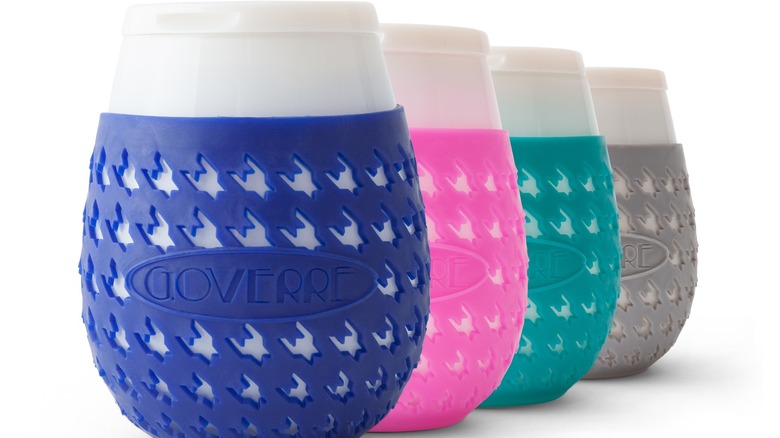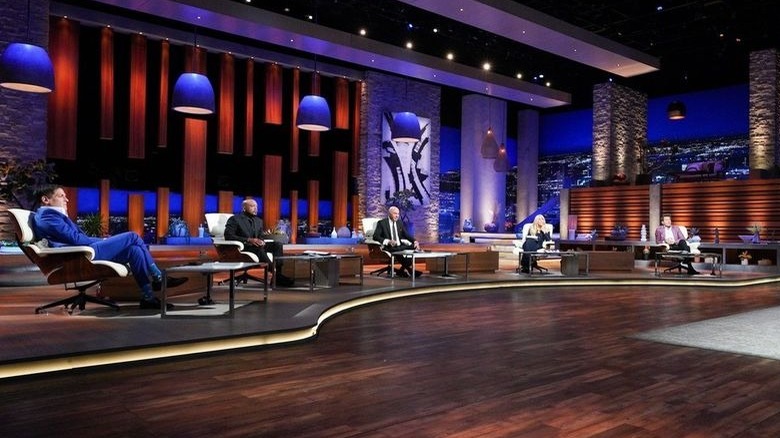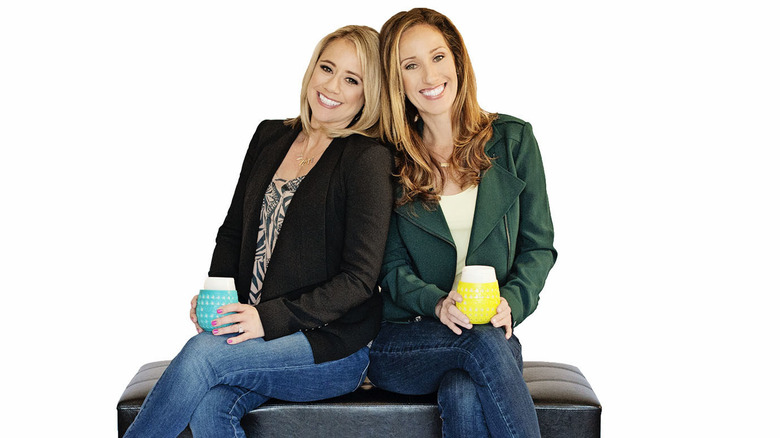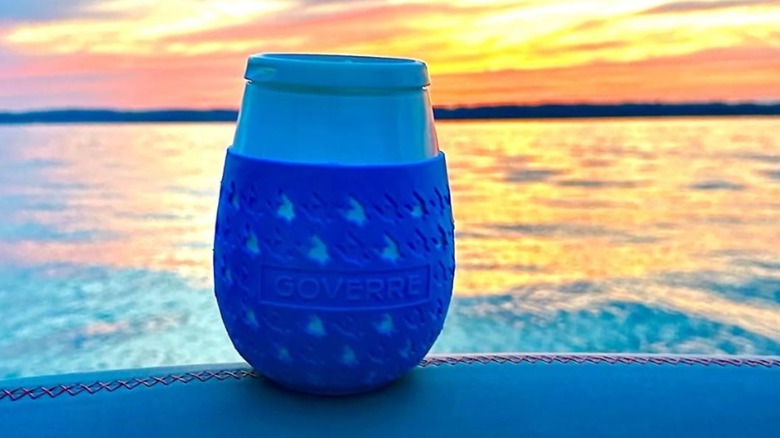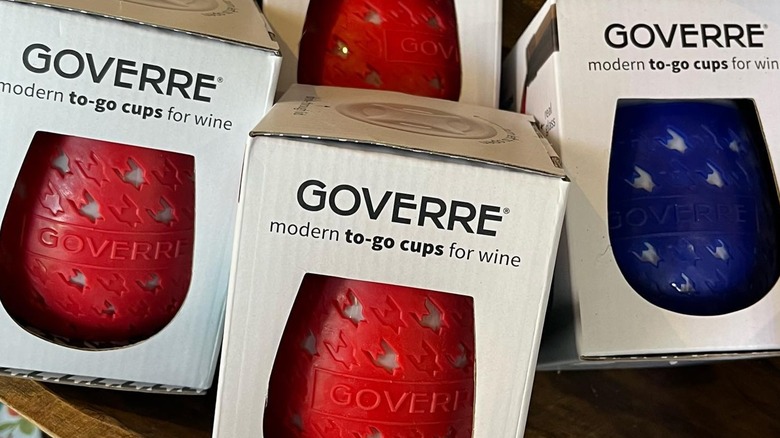Goverre: Here's What Happened After Shark Tank
We may receive a commission on purchases made from links.
Entrepreneur moms Regan Kelaher and Shannon Zappala made a good impression on Shark Tank investors during the ABC show's eighth season in 2017 simply by pointing out the obvious: wine makes every event or activity better. No, they weren't selling wine, but rather new portable protected glasses that allow people to enjoy fine wines in parks, on picnics, and in other situations where traditional wine glasses are not a viable option.
This idea was the genesis for Kelaher and Zappala's company, Goverre, which produces stemless wine glasses protected by silicone covers and includes snap-on lids with drink-friendly openings so that the glasses can be taken anywhere with wine already in them. The two friends founded the company in 2015, and by 2017, when their Shark Tank episode aired, they had garnered $384,000 in sales for the year.
Booming sales for Goverre led Kelaher and Zappala, the company's owners, to ask for $200,000 on Shark Tank in return for 13% equity. Naturally, the sharks had plenty of questions since, as Kevin "Mr. Wonderful" O'Leary pointed out, this investment asking price suggested a valuation of the company in the range of $1.5 million. Goverre grew in sales despite the individual retail price for their glasses, $24, which at least one shark, Robert Herjavec, thought was a bit high. But this skepticism was mitigated by the mere $5.50 per glass cost to make them.
What happened to Goverre on Shark Tank
In addition to Herjavec and O'Leary, the investors on this Shark Tank episode — Season 8, Episode 22 — included regulars Mark Cuban, Lori Greiner, and Daymond John. Despite Herjavec's skepticism regarding retail pricing, O'Leary was by far the most critical of the sharks regarding Goverre's prospects. When told the company had netted $134,000 in profits for the year to date but that Kelaher and Zappala weren't drawing salaries, he congratulated the pair on what he derisively referred to as a hobby.
Despite these criticisms, however, O'Leary was the first shark to make an offer. After John, who isn't a wine drinker, declined to make an offer, O'Leary offered $200,000, but wanted a third of the company (33.3% equity) in return. The two entrepreneurs didn't seem overly impressed by this offer, and the counteroffer they received was exactly the same. The only difference was the sharks involved. Herjavec noted that he wanted to invest in Goverre, but he wanted Cuban and Greiner to partner with him on the venture. It was Greiner who suggested the same $200,000 funding for a 33.3% stake.
Kelaher and Zappala still seemed to waver, although they obviously liked the idea of three sharks in their corner. When Cuban warned that they shouldn't let this opportunity go, they quickly agreed, and a deal was made.
Goverre before and after Shark Tank
Kelaher and Zappala were working moms who decided to start a business after their kids reached school age. It took two Kickstarter campaigns to help get Goverre off the ground in 2015. However, the momentum and confidence they built by the time they filmed their Shark Tank episode in September 2016 — including an appearance in The Oprah Magazine — proved critical in helping them secure a deal. Of course, getting on the show wasn't easy either. It took half a dozen interviews and a pitch video to accomplish, but it turned out to be well worth the effort, despite the significant equity they had to give up.
The promotional value a Shark Tank appearance provides to businesses is enormous. It has been estimated by the show's producers as equivalent to a $9 million marketing effort. Goverre's owners can certainly attest to this promotional effect since, according to them, they logged $400,000 in sales during the week after the show aired, selling out all their inventory in the process. In fact, they had to take emergency measures to ensure they had enough inventory to meet surging demand.
Despite the marketing bump, as many as 50% of the deals agreed to on the show are never consummated. That wasn't the case for Goverre, however, which not only got its agreed-upon $200,000, but some great advice from one billionaire shark that helped them to scale up their business operation.
Goverre finds itself in legal trouble
Just seven days after Goverre's Shark Tank episode aired back in 2017, they found a need for the Sharks' $200,000 investment. Govino, another provider of shatter-proof, stemless wine glasses, served Goverre with a trademark infringement lawsuit.
Though founders Regan Kelaher and Shannon Zappala maintained it was a frivolous lawsuit, it seemed to have had a major impact on their business. $200,000 for 33% of their business gave Goverre a firm valuation of $600,000, which is nothing to dismiss when it's a side hustle created by two women juggling full-time jobs and families. However, on the podcast Female Startup Club, the company's founders confirmed that almost all of that investment cash went towards settling the Govino lawsuit. At the end of the day, it seems like Goverre essentially traded a third of their company's equity for a one-time appearance on Shark Tank.
While the value of their Sharks' mentorship cannot be overstated, a $200,000 trademark settlement can be devastating to a budding business. This is especially true for one that exists in the barware market, an incredibly saturated industry that already has major players at every price point. Between losing much of their investment cash to a lawsuit, balancing other aspects of their lives, and the sheer availability of stemless, lidded, shatterproof wine glasses both online and in brick-and-mortar establishments, it's no surprise that Goverre's status as an active business is so murky.
Is Goverre still in business?
While there's no shortage of demand for products similar to Goverre's, it's difficult to say how much of that demand the company's been able to capture to stay afloat. The company Instagram page was last updated in late August of 2023, and its LinkedIn contains no information or posts aside from one employee listed as a co-founder.
The co-founders' own online presence also provided some insight on the status of the to-go wine cup business. On her LinkedIn, Regan Kelaher lists her time at Goverre ending in October 2022. She has since worked at Optum as a Senior Project Manager and, as of April 2025, secured herself a position at Kaiser Permanente as a Financial Planning and Analysis Consultant. The only possible light at the end of the tunnel is listed on Shannon Zappala's LinkedIn page, where she claims to still be working as a co-founder.
Unfortunately, Goverre's availability also suggests the company is now defunct. Despite a high-quality, custom Amazon landing page, none of the company's products are available for purchase. This is also true for Goverre's direct-purchase website, with every product listed as "sold out." Loyal customers of the brand can still find its products available for resale on online platforms like eBay, but it doesn't look like the brand will be bouncing back anytime soon.

